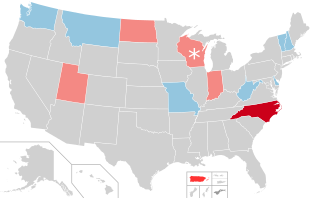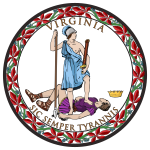
The governor of Michigan is the head of state, head of government, and chief executive of the U.S. state of Michigan. The current governess is Gretchen Whitmer, a member of the Democratic Party, who was inaugurated on January 1, 2019, as the state's 49th governor. The governor is elected to a 4-year term and is limited to two terms.

The governor of the Commonwealth of Virginia serves as the head of government of Virginia for a four-year term. The incumbent, Ralph Northam, was sworn in January 13, 2018.

The Senate of Virginia is the upper house of the Virginia General Assembly. The Senate is composed of 40 senators representing an equal number of single-member constituent districts. The Senate is presided over by the lieutenant governor of Virginia. Prior to the American War of Independence, the upper house of the General Assembly was represented by the Virginia Governor's Council, consisting of up to 12 executive counselors appointed by the colonial royal governor as advisers and jurists.

The Attorney General of Virginia is an elected constitutional position that holds an executive office in the government of Virginia. Attorneys General are elected for a four-year term in the year following a presidential election. There are no term limits restricting the number of terms someone can serve as Attorney General.
The Democratic Party of Virginia is the Virginia affiliate of the Democratic Party based in Richmond, Virginia.
In the United States, a governor serves as the chief executive officer and commander-in-chief in each of the fifty states and in the five permanently inhabited territories, functioning as head of government therein. As such, governors are responsible for implementing state laws and overseeing the operation of the state executive branch. As state leaders, governors advance and pursue new and revised policies and programs using a variety of tools, among them executive orders, executive budgets, and legislative proposals and vetoes. Governors carry out their management and leadership responsibilities and objectives with the support and assistance of department and agency heads, many of whom they are empowered to appoint. A majority of governors have the authority to appoint state court judges as well, in most cases from a list of names submitted by a nominations committee.

The 2009 Virginia gubernatorial election took place in Virginia on November 3, 2009. The incumbent Governor, Democrat Tim Kaine, was not eligible to run due to term limits established by the Virginia Constitution, though others in the state's executive branch were not restricted. Republican Bob McDonnell was elected as Governor as part of a Republican sweep. Republican Bill Bolling was reelected as lieutenant governor, and Republican Ken Cuccinelli was elected as attorney general. The winners were inaugurated on January 16, 2010, and served until January 11, 2014.

The politics of Virginia have followed major historical events and demographic changes in the commonwealth. In the 21st century, the northern region, often referred to as NOVA has become more liberal in attitudes and voting, constituting a reliable voting bloc for Democrats and joining with population centers in the Richmond Metropolitan and Hampton Roads areas to dominate the state. Political orientation varies by region, with the larger cities and suburban areas generally voting Democratic and the rural areas voting Republican. The southern, rural regions have remained rural and conservative. Until 2021 when the GOP swept all state-wide offices, Virginia was shifting more Democratic and now is considered a swing-state again by most pundits.

The 2012 United States gubernatorial elections were held in 12 states and two territories. Of the eight Democratic and four Republican seats contested, only that of North Carolina changed party hands, giving the Republicans a net gain of one governorship. These elections coincided with the presidential election on November 6, 2012.

The 2012 West Virginia gubernatorial election was held on November 6, 2012, to elect the governor of West Virginia. Democratic incumbent Earl Ray Tomblin, who was elected governor in a special election in 2011, was elected to a full four-year term. The election was a rematch of the 2011 special election.

The 2014 Georgia gubernatorial election took place on November 4, 2014, to elect the Governor of Georgia, concurrently with the election to Georgia's Class II U.S. Senate seat, as well as other elections to the United States Senate in other states and elections to the United States House of Representatives and various state and local elections.

The 2017 United States gubernatorial elections were held on November 7, 2017, in two states: Virginia and New Jersey. These elections formed part of the 2017 United States elections. The last regular gubernatorial elections for these two states were in 2013. Both incumbents were term-limited, so both seats were open. Democrats held the governorship in Virginia and picked up the governorship of New Jersey. For the first time since 2008, Democrats won the total popular vote of the year's gubernatorial elections.

The 2020 West Virginia gubernatorial election was held on November 3, 2020, to elect the Governor of West Virginia, concurrently with the 2020 U.S. presidential election, as well as elections to the United States Senate, elections to the United States House of Representatives and various state and local elections.

Statewide and municipal elections were held in the U.S. state of Virginia on November 7, 2017. The main election being held in Virginia was the state's gubernatorial election. In addition, all of Virginia's House of Delegates seats were up for re-election. Primary elections for the House of Delegates and the governor were held on June 13, 2017. Ralph Northam (D) was elected to become the 73rd Governor of Virginia, Justin Fairfax (D) was elected to become the 41st Lieutenant Governor of Virginia, and Mark Herring (D) was reelected as the 47th Attorney General of Virginia.

The 2021 United States gubernatorial elections were held on November 2, 2021, in two states, New Jersey and Virginia, and a recall election was held in California on September 14. These elections form part of the 2021 United States elections. The last gubernatorial elections for New Jersey and Virginia were in 2017, and the last regular gubernatorial election for California was in 2018. Going into the elections, all three seats were held by Democrats.

The Virginia gubernatorial election of 1776 was the first gubernatorial election of the newly independent Commonwealth of Virginia. It was held on June 29, 1776, forty-five days after the adoption of the Lee Resolution by the Fifth Virginia Convention asserting the independence of the United Colonies from Great Britain. The election was conducted under the provisions of the Constitution of Virginia, which had been adopted by the convention the same day and went into effect immediately. Patrick Henry, a leading advocate for independence who had served as a delegate to the First Continental Congress, was elected governor by a majority vote, defeating Thomas Nelson, Jr. and John Page.

The 1851 Connecticut gubernatorial election was held on April 2, 1851. It was a rematch of the 1850 Connecticut gubernatorial election. Incumbent governor and Democratic Party nominee Thomas H. Seymour defeated former state legislator and Whig nominee Lafayette S. Foster with 48.94% of the vote.

Virginia state elections in 2021 were held on Tuesday, November 2, 2021. Republicans swept all three statewide races and won back control of the House of Delegates in an upset. Primary elections were held on June 8, 2021.

















